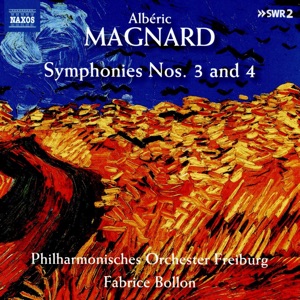There’s little to quibble about concerning this well-filled new disc containing Albéric Magnard’s two best (and best-known) symphonies. Fabrice Bollon delivers confident, flowing performances that fully encompass the music’s wide-ranging expressive vocabulary, from the haunting modal opening of the Third Symphony, to an amazing clean and clear fugal development in the finale of the Fourth. He and the Freiburg orchestral clearly enjoy the rustic charm of the two scherzos, while the profound lyricism of the slow movements emerges naturally and songfully, without dragging.
If there are any negatives, they have to do with the Freiburg Philharmonic which, despite committed playing, sounds a bit undernourished in the string section. In the richly scored Fourth Symphony the added clarity this offers the woodwinds compensates to some degree, but I found myself wishing that these symphonies would get picked up by one of our truly great orchestras. The music deserves the attention, and it would be wonderful to hear it done at the very highest level. As it stands, this does not displace Thomas Sanderling’s reference versions on BIS, but it’s a heck of a lot less expensive and well worth hearing all the same.
































